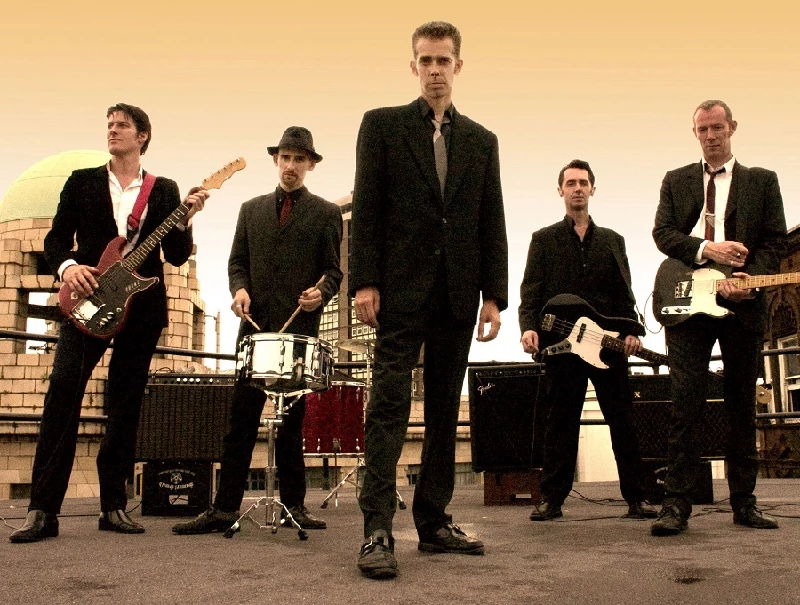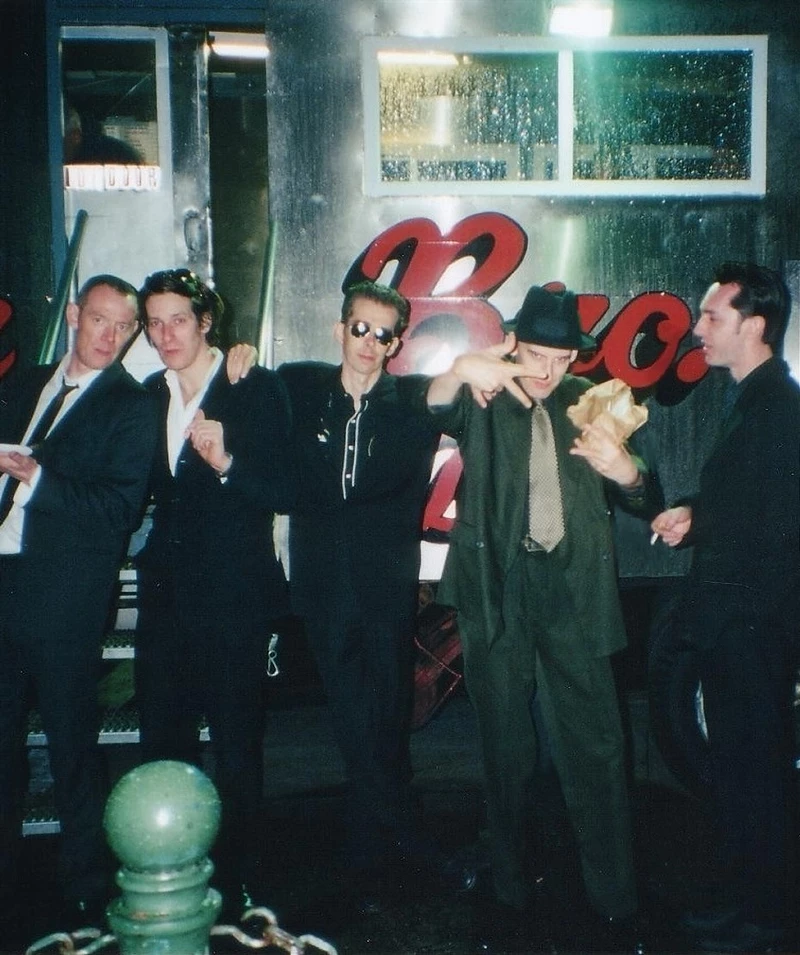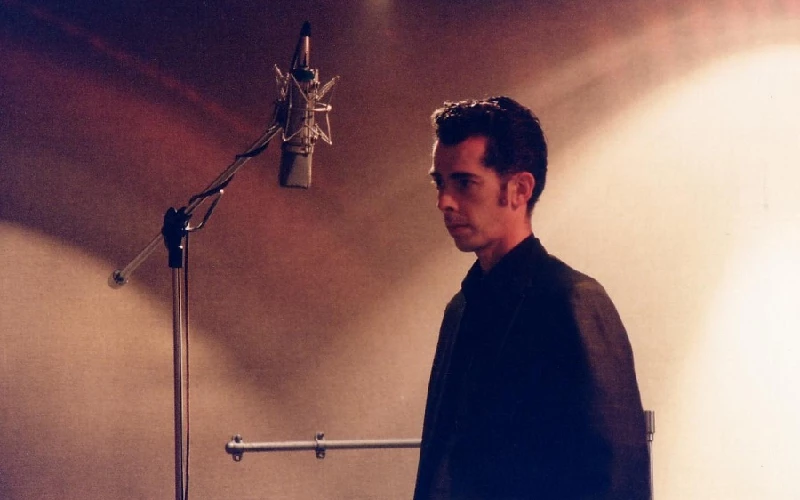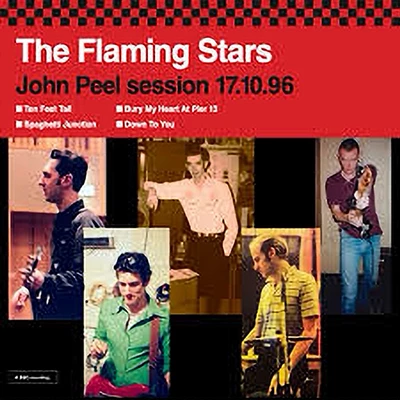Flaming Stars - Interview
by Dave Goodwin
published: 4 / 5 / 2024

intro
UK garage punk band the Flaming Stars have two of their old John Peel sessions out on vinyl for the first time. Frontman Max Décharné talks about the importance of John Peel for the band, its high output career, and the impact of early MP3s on small bands and labels.
Every now and again we get the chance to delve into and, as in this case, to go back in time to our roots. I remember the Flaming Stars from back in the day, but missed some of their output because of girls, beer and the like. While I picked up a bit of inaccurate information during my research, lead singer Max Décharné, while quite rightly putting me straight, was superbly gracious enough to go with me for the rest of the interview. Since their first EP in March 1995, The Flaming Stars have released eight albums, if you include a 42 track compilation album ‘London After Midnight: Singles, Rarities and Bar Room Floor-Fillers 1995-2005’. They gigged extensively in the UK and Germany and played shows in France, Holland, Denmark, Sweden, Greece and Japan. You will probably notice another article in this edition on two John Peel Sessions released on 10” Vinyl, which is a fantastic introduction to the sort of music unleashed by the wonderful Flaming Stars. This little chat with Max covers those two Sessions, released by Precious Recordings of London, and takes us back through the band’s history, from the time they were created to more recent happenings. Max is a very informed and clever chap with a joyously dry sense of humour. He also has other projects outside of the band, which becomes apparent as the interview goes on. PB: First question is quite an in depth one. These Recordings on the Precious 10” were recorded over 20 years ago. I think there were seven other sessions recorded. What do you remember about them? MD: We did six other sessions. They came out on a double CD in June 2000 called, with devastating logic, ‘The Six John Pl Sessions’, and John kindly wrote the sleeve notes for us because I asked him if he would. The two that have just come out include one from October 1996, recorded completely live in Manchester when John was sitting in for Mark Radcliffe, and our final one from February 2002, recorded like the others at BBC Maida Vale Studios. Maida Vale is a superb facility with a history as a studio complex going back to 1934. The fact that the BBC sold it off last year is a disgrace; you can’t replace a setup like that. I’d done a session back in 1991 when I was in Gallon Drunk, then our first Flaming Stars session was in 1995, shortly after our debut EP came out. The format was always the same: show up at midday, usually on a Sunday, and you’ve got the afternoon to record four or five songs. Go down the pub for about an hour then spend two or three hours in the evening mixing the tracks, and that’s your session, which would usually be broadcast a week or so later. John was never there, just the BBC engineers, who were really good at getting a band miked up and recorded well in a short space of time. There’s no room for mucking around. Basically you put the track down live then maybe add an overdub here or there and move on to the next one. John liked to hear the session for the first time on air, just as his listeners were hearing it, so his reactions and comments would be spontaneous. That wouldn’t have been the case if he’d come along to the studio. Also, he was quite shy, so didn’t particularly want to come along and hang around with bands. I met him at various times over the years, and interviewed him at length in 2004 for a book I was writing, and he was absolutely charming, and very, very funny. Our 1996 session which was done live from Manchester was different, because it was a live broadcast, so hundreds of thousands of people were listening via radio as we played, and John was there in person. He was really friendly, but was based a couple of floors up in the control room, so he wasn’t watching us as we played. He was allowed two guest bands that week, and had asked us one night and Half Man Half Biscuit the other, which was really good of him. We just had a few beers and treated it like a gig. PB : What are your favourite memories of the sessions you did? MD: Some bands take months to make a record and use a lot of studio manipulation to build up their tracks piece by piece. We were never like that. Our records were generally recorded fast and essentially live in the studio with minimal overdubs, so doing a Peel Session was a very similar experience for us. Everyone in the band played what seemed good to them at the time, and then we’d all sit around during the mixing and discuss how it should sound. It was very much a collaborative effort – it had to satisfy all of us. I can’t really pick out the best bits, because each of us would have their own opinions as to what had worked. Listening back to the tracks now, I’d say we’re pretty happy with them. Going to Maida Vale to record was always an enjoyable experience, so there’s a lot of good memories there. You could really feel the history in those rooms of all the bands who’d worked there over the decades. Many of the engineers you’d record with had been there since the 70s or 80s, and had some interesting stories of famous sessions, having recorded people like Joy Division, Buzzcocks or T Rex there. PB: Did you experience any shift in interest in the band from recording these sessions with John Peel and having the music played on the radio at that time? MD : John really had an effect. He let people know we existed and what we sounded like, not to mention saying some very nice things about us on air. As I say, he gave us our first session a month or two after our debut EP came out. He’d been playing one track from it, ‘Kiss Tomorrow Goodbye’, almost every night, so I got hold of a phone number for his producer and asked if he’d be up for a session. She asked him and he said yes, and there we were. The fact that he played us a lot on his show and kept giving us sessions every year or so really made a huge difference to us. Mostly, the UK music press weren’t particularly interested in us. We’d get a few reviews, but not so much in the way of articles or interviews. Britpop, Oasis and all that kind of thing was what they were pushing at the time, and we didn’t remotely fit the profile. So the exposure we got on John’s show was massively important to us. It felt like the main reason why anyone had heard of us, and we owe him a hell of a lot. PB: You guys recorded your first two Albums in ’96 and ‘97, then there was a large gap until the third in 2001 I believe? Which sounded totally different from the first two. What was the reasoning behind the change in direction? MD: All due respect, as they liked saying in The Sopranos, sorry, that’s just not remotely how it was. Our first album, ‘Songs From The Bar Room Floor’, was June 1996. By March 1997, we’d released so many non-album singles and EPs we put out a whole album of those called ‘Bring Me The Rest Of Alfredo Garcia (Singles 1995-1996)’. Our second studio album ‘Sell Your Soul To The Flaming Stars’ came out just seven months later in October 1997. Then our third studio album, ‘Pathway’, came out less than two years later in May 1999. The fourth, ‘A Walk On The Wired Side’, was just nine months after that, in February 2000. Two years later, we put out the fifth one, ‘Sunset & Void’, in September 2002, and two years after that came the sixth, ‘Named and Shamed’, in October 2004, at which point the label Vinyl Japan went out of business. We spoke to Big Beat and did a deal for our seventh studio album, ‘Born Under A Bad Neon Sign’, and also a double-CD compilation, ‘London After Midnight (Singles, Rarities & Bar Room Floor-Fillers)’, both of which came out in 2006. So, no large gaps – quite the opposite in fact. That’s seven studio albums in ten years. We put out about 140 individual studio tracks between 1995 and 2006, a hell of a work rate, especially at a time when plenty of major label bands would spend three or four years laboriously working on a ten track album. No ‘change of direction’ either. We’ve been remarkably consistent to the pattern we set out when we first began gigging in late 1994, and all of what we put out sounds first and foremost like a Flaming Stars record. That was the only standard by which we ever judged ourselves and what we recorded – ‘does it sound like us?’ PB: Arguably, the largest selling track from you guys was ‘Some Things You Don't Forget’ which was from that 2000 album ‘A walk on the wired side’. What was behind that success, do you think? MD: Arguably indeed, and I’m not quite sure where that figure is supposed to come from. ‘Some Things…’ was a double A-side with ‘Only Tonight’. The latter song got far more attention, and has had seventeen times the number of plays on YouTube, which is still way short of the amount of plays ‘You Don’t Always Want What You Get’, from the same album has had. Yet even that one didn’t really sell any more than the others, and our sales were never anything to write home about anyway. The vast majority of our stuff isn’t up on streaming services, so that’s no indicator of which ones of them are popular either. In fact, the time when we really got noticed in terms of radio play, sales and reviews was in the mid-90s during our first two years, and the single that got the most attention was ‘Ten Feet Tall’ (released December 1996). That had a hell of a lot of radio play, sold out its limited edition single pressing in about a month, and the DIY video we shot for £250 even got on the BBC TV show Top Of The Pops 2. For what it’s worth, we had one song in Peel’s 1995 Festive Fifty (‘Kiss Tomorrow Goodbye’), and two in his 1996 Festive Fifty (‘Ten Feet Tall’ and ‘The Face On The Bar Room Floor’), which was compiled from votes from his listeners, so that’s something we’re very proud of. If there was ever a brief moment when we were mildly in danger of becoming popular, that would be it. We consistently put out a new album at an average rate of one every 17 months, along with regular singles and EPs, and weren’t remotely bothered about changing times or whatever happened to be supposedly trendy in the wider music world at the time. We wouldn’t have dreamt of altering anything of ours to suit any external forces – the question never even occurred to us. We always just did what we felt like, with zero record company interference, and all of our stuff just sounds like the Flaming Stars to me. PB: In 2006, the label you were signed to went bankrupt. How did this affect the band at that time? How did you get yourselves signed up on to Big Beat and what was the difference ( if any ) between the two? MD : The Vinyl Japan label collapsed at the end of 2004, largely because of the effects of illegal internet music downloading. Put simply, in the late 90s, most bands on the label might have done an album and sold three or four thousand copies. That was enough to turn a small profit for the label, and so they were then happy to put up the money for the next release, and so it went on. Once people started ripping off tracks for free rather than buying physical copies, it got to a stage in the early 2000s where everyone on the label would only sell maybe half of what they would previously had done, so what used to make a profit then made a loss. The major labels could afford to lose sales to illegal downloading and still make lots of money, but it destroyed the whole business model for plenty of small labels like Vinyl Japan. The end result was that a lot of albums that might have existed never got made, because the funds dried up. To put that into context: imagine if everyone decided they didn’t feel like paying a plumber for coming round and fixing broken bathroom fixtures and just wanted it all done for free. Recording studios still charge money, so do record pressing plants. It’s only the bands that are somehow supposed to give everything away for nothing. It’s pretty simple, if you like a band that’s on our level – tight budgets, no major label etc – buy their record, otherwise the business model that allowed them to go on making them won’t exist anymore. When Vinyl Japan went to the wall, I had a word with the good people at Ace Records/Big Beat, who I’d known for a long time. They were mostly interested in our back catalogue and wanted to do a compilation, and they also agreed to fund a new studio LP as well. However, by that stage, their core business was as a reissue label – one of the best in the world – so doing brand new recordings was not generally what they were about. We’re very proud of the album we made for them, ‘Born Under A Bad Neon Sign’, which came out in 2006, but that was a one-off deal. PB : What have you been up to since the last album? Is there anything in the pipeline for a Stars return? MD: We played a hell of a lot of shows since the last album, in many different countries. What we didn’t have was a record company willing to bankroll the recording of a new record. Also, after the tragic early death of the great John Peel in October 2004, the main person on national radio who’d consistently championed our music and given people the chance to hear it was no longer there. Here we all are, twenty years later, still talking about him. It’s a measure of his influence that there’s such a fine response to all of the series of 10 inch Peel Sessions which Precious Recordings of London have been putting out. We’re really happy to have been included in their catalogue, and the reaction we’ve had on social media has been very good to see. Clearly, many people out there have a lot of time for all kinds of recordings made for John’s show over the years, and rightly so. As for a Stars return, that would be an ecumenical matter… PB: Thank you.
Band Links:-
https://en.wikipedia.org/wiki/The_Flaming_StarsPlay in YouTube:-
Picture Gallery:-


favourite album |
|
John Peel Sessions 17.10.96 and 19.02.02 (2024) |

|
| Dave Goodwin reviews a pair of delightful John Peel sessions from The Flaming Stars , beautifully packaged by Precious Recordings of London in this vinyl release. |
most viewed articles
current edition
Peter Doherty - Blackheath Halls, Blackheath and Palace Halls, Watford, 18/3/2025 and 21/3/2025Armory Show - Interview with Richard Jobson
Liz Mitchell - Interview
Lauren Mayberry - Photoscapes
Deb Googe and Cara Tivey - Interview
Max Bianco and the BlueHearts - Troubadour, London, 29/3/2025
Garfunkel and Garfunkel Jr. - Interview
Sukie Smith - Interview
Clive Langer - Interview
Maarten Schiethart - Vinyl Stories
previous editions
Heavenly - P.U.N.K. Girl EPBoomtown Rats - Ten Songs That Made Me Love....
Trudie Myerscough-Harris - Interview
Doris Brendel - Interview
Beautiful South - Ten Songs That Made Me Love...
Dwina Gibb - Interview
Pulp - Ten Songs That Made Me Love...
Kay Russell - Interview with Kay Russell
Oasis - Oasis, Earl's Court, London, 1995
Sound - Interview with Bi Marshall Part 1
most viewed reviews
current edition
Davey Woodward - Mumbo in the JumboNigel Stonier - Wolf Notes
Wings - Venus and Mars
Kate Daisy Grant and Nick Pynn - Songs For The Trees
Only Child - Holy Ghosts
Neil Campbell - The Turnaround
Philip Jeays - Victoria
Darkness - Dreams On Toast
Suzanne Vega - Flying With Angels
Charles Ellsworth - Cosmic Cannon Fodder
Pennyblackmusic Regular Contributors
Adrian Janes
Amanda J. Window
Andrew Twambley
Anthony Dhanendran
Benjamin Howarth
Cila Warncke
Daniel Cressey
Darren Aston
Dastardly
Dave Goodwin
Denzil Watson
Dominic B. Simpson
Eoghan Lyng
Fiona Hutchings
Harry Sherriff
Helen Tipping
Jamie Rowland
John Clarkson
Julie Cruickshank
Kimberly Bright
Lisa Torem
Maarten Schiethart